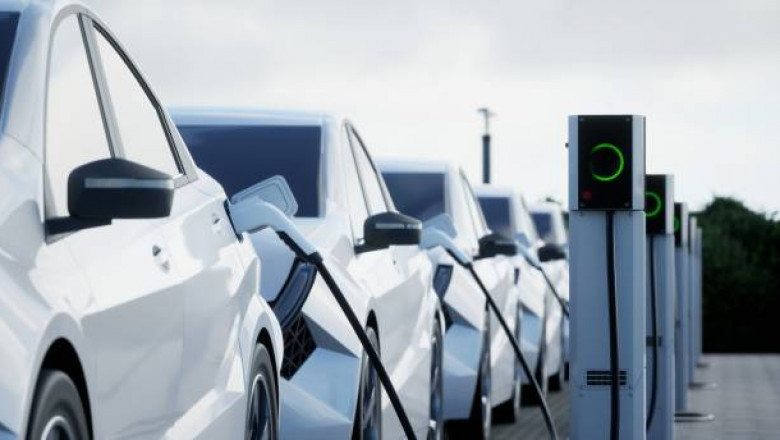views
E-Mobility Services: The Future of Transportation

Introduction:
As the world shifts toward sustainable practices, the rise of e-mobility services is transforming how we think about transportation. This evolution is driven not only by the need for greener alternatives but also by the innovative partnerships between automakers and tech companies. These collaborations are crucial for accelerating the development of electric vehicles (EVs), charging infrastructure, and digital services that enhance user experience.
Understanding E-Mobility
E-mobility encompasses a range of electric-powered transportation solutions, including electric cars, bikes, scooters, and public transit systems. With growing concerns about climate change and urban air quality, e-mobility services present an environmentally friendly alternative to traditional gasoline-powered vehicles. Key components of e-mobility include:
1. Electric Vehicles (EVs): Cars, bikes, and scooters that use electric power.
2. Charging Infrastructure: Stations and networks for recharging EVs.
3. Digital Services: Apps and platforms for managing transportation options, route planning, and charging station locations.
The Role of Partnerships in E-Mobility
As the e-mobility market grows, so does the need for partnerships that leverage the strengths of different industries. Successful collaborations between automakers and tech companies are paving the way for innovative solutions that enhance the e-mobility ecosystem. Let’s explore some notable partnerships that are driving this change.
1. Ford and Google: Pioneering Data-Driven Mobility Solutions
In 2021, Ford announced a strategic partnership with Google to leverage cloud computing and artificial intelligence (AI) for the development of smart vehicles. This collaboration aims to enhance connected vehicle experiences and optimize the performance of Ford’s electric vehicles.
Key Innovations:
· Data Analytics: Ford utilizes Google Cloud to analyze vast amounts of vehicle data, enabling real-time insights into driver behavior and vehicle performance.
· AI-Powered Services: Integration of AI tools for predictive maintenance, personalized driving experiences, and enhanced safety features.
By combining Ford’s automotive expertise with Google’s tech prowess, this partnership is set to transform how consumers interact with their vehicles, making the e-mobility experience more intuitive and efficient.
2. BMW and Intel: Revolutionizing Autonomous Driving
BMW’s collaboration with Intel and Mobileye aims to develop cutting-edge autonomous driving technology. This partnership is essential for the future of e-mobility, where self-driving capabilities will play a significant role in urban transportation.
Key Innovations:
· Autonomous Driving Platform: The joint effort focuses on creating a scalable platform for autonomous vehicles, integrating high-definition maps and real-time data processing.
· Safety Enhancements: Advanced driver-assistance systems (ADAS) developed through this partnership enhance vehicle safety, paving the way for fully autonomous EVs.
By aligning automotive engineering with advanced computing and AI, BMW and Intel are driving innovation that could redefine personal and public transportation.
3. Volkswagen and Microsoft: Accelerating EV Development
Volkswagen’s partnership with Microsoft focuses on the integration of cloud technology to support its electric vehicle initiative, known as "Volkswagen Industrial Cloud."
Key Innovations:
· Cloud-Based Solutions: The partnership aims to streamline production processes for EVs, enabling real-time data analysis to enhance manufacturing efficiency.
· Mobility as a Service (MaaS): The collaboration also explores digital mobility solutions, such as ride-sharing platforms that utilize electric vehicles.
This alliance not only accelerates Volkswagen's EV production but also positions the company to compete in the rapidly evolving e-mobility market.
4. Daimler and Bosch: Shaping the Future of Urban Mobility
Daimler, the parent company of Mercedes-Benz, has teamed up with Bosch to develop a fleet of autonomous electric vehicles for urban environments. This partnership focuses on redefining how people navigate cities.
Key Innovations:
· Autonomous Ride-Hailing Services: The development of self-driving electric shuttles aims to reduce congestion and pollution in urban areas.
· Shared Mobility Solutions: By creating a fleet of autonomous EVs, Daimler and Bosch promote shared mobility, reducing the need for personal vehicle ownership.
This partnership exemplifies how automakers can collaborate with tech firms to address urban mobility challenges while promoting sustainability.
The Impact of E-Mobility Partnerships
The partnerships discussed above illustrate the diverse ways automakers and tech companies are innovating within the e-mobility sector. These collaborations offer several advantages:
1. Accelerated Innovation: By pooling resources and expertise, partners can develop new technologies and services at a faster pace.
2. Enhanced User Experience: Innovations in connected vehicles and digital services lead to improved consumer interactions and convenience.
3. Sustainability Goals: Partnerships are crucial in advancing the development of EVs and charging infrastructure, which are vital for achieving global sustainability targets.
Challenges and Considerations
While partnerships in the e-mobility space have shown great promise, they also face challenges:
1. Data Security and Privacy: With increased data collection comes the responsibility to protect consumer information. Companies must ensure robust cybersecurity measures are in place.
2. Regulatory Hurdles: Navigating the complex landscape of regulations and standards can be daunting for partnerships, especially when involving multiple regions or countries.
3. Integration of Technologies: Combining different technologies and platforms can lead to compatibility issues. Effective communication and collaboration between partners are essential.
The Future of E-Mobility Partnerships
Looking ahead, the potential for new partnerships in e-mobility is vast. As technology continues to evolve, we can expect to see more collaborations that focus on:
· Sustainable Energy Solutions: Partnerships between automakers and renewable energy companies can enhance charging infrastructure and promote green energy use.
· Smart Cities Initiatives: Collaborations that integrate e-mobility services with smart city technologies will improve urban living and reduce traffic congestion.
· Advanced Mobility Solutions: New alliances will likely focus on developing integrated mobility services, combining public transit, shared vehicles, and on-demand transportation.
Conclusion
E-mobility services are reshaping the future of transportation, driven by innovative partnerships between automakers and tech companies. These collaborations are essential for developing electric vehicles, enhancing user experiences, and addressing urban mobility challenges. As the world continues to prioritize sustainability, the e-mobility sector will play a crucial role in creating a cleaner, smarter future. By analyzing successful partnerships, we can glean valuable insights into how collaboration can drive innovation and progress in the e-mobility space, ultimately leading us toward a more sustainable transportation landscape.
See the full article: https://www.nextmsc.com/blogs/study-of-e-mobility-services-market






















Comments
0 comment